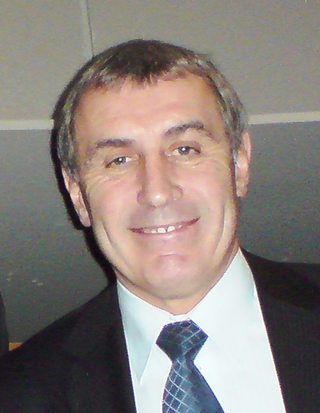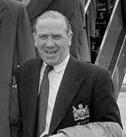
Sir Robert Charlton was an English professional footballer who played as an attacking-midfielder, left-winger or centre-forward. Widely considered one of the greatest players of all time, he was a member of the England team that won the 1966 FIFA World Cup, the year he also won the Ballon d'Or. He finished second in the Ballon d'Or voting in 1967 and 1968. He played almost all of his club football at Manchester United, where he became renowned for his attacking instincts, passing abilities from midfield, ferocious long-range shooting from both left and right foot, fitness, and stamina. He was cautioned only twice in his career; once against Argentina in the 1966 World Cup, and once in a league match against Chelsea. With success at club and international level, he was one of nine players to have won the FIFA World Cup, the European Cup and the Ballon d'Or. His elder brother Jack, who was also in the World Cup–winning team, was a former defender for Leeds United and also for ten years was the manager of the Republic of Ireland.

Gordon Banks was an English professional footballer who played as a goalkeeper. Widely regarded as one of the greatest goalkeepers of all time, he made 679 appearances during a 20-year professional career, and won 73 caps for England, highlighted by starting every game of the nation's 1966 World Cup victory.

Peter Philip Bonetti was an English professional footballer who played as a goalkeeper for Chelsea, the St. Louis Stars, Dundee United and England. He was known for his safe handling, lightning reflexes and his graceful style, for which he was given the nickname "The Cat". He was one of several goalkeepers who specialised in a one-armed throw which could achieve a similar distance to a drop kick.

Peter Leslie Shilton is an English former professional footballer who played as a goalkeeper.
Michael David Jones is an English former footballer who played as centre forward with Leeds United during the 1960s and 1970s. He was also capped for England.

Emlyn Walter Hughes was an English footballer. He started his career at Blackpool in 1964 before moving to Liverpool in 1967. He made 665 appearances for Liverpool and captained the side to three league titles and an FA Cup victory in the 1970s. Added to these domestic honours were two European Cups, including Liverpool's first in 1977; and two UEFA Cup titles. Hughes won the Football Writers' Player of the Year in 1977. Hughes completed a full set of English football domestic honours by winning the League Cup with Wolverhampton Wanderers in 1980. In addition to Wolves, he later played for Rotherham United, Hull City, Mansfield Town and Swansea City. Hughes earned 62 caps for the England national team, which he also captained.

Raymond Neal Clemence, was an England international football goalkeeper and part of the Liverpool team of the 1970s. Regarded as one of the greatest goalkeepers of all time, he is one of few players to have made over 1,000 career appearances, and holds the record for the most clean sheets in the history of football (460). Winning three European Cups, five League titles, two UEFA Cups, a UEFA Super Cup, an FA Cup and a League Cup with Liverpool, the last of his 665 appearances for the club was the victorious 1981 European Cup Final. In 1981, after being phased out at Liverpool, Clemence joined Tottenham Hotspur, winning a UEFA Cup, an FA Cup, and a Charity Shield with them, before retiring from football in 1988.

Thomas Henderson Docherty, commonly known as The Doc, was a Scottish football player and manager. Docherty played for several clubs, most notably Preston North End, and represented Scotland 25 times between 1951 and 1959. He then managed a total of 13 clubs between 1961 and 1988, as well as the Scotland national team. Docherty was manager of Manchester United between 1972 and 1977, during which time they were relegated to the Second Division, but promoted back to the First Division as champions at the first attempt.
The 1977–78 season was the 98th season of competitive football in England.
Brian Greenhoff was an English footballer who played in the Football League for Manchester United, Leeds United and Rochdale. He was capped 18 times for England.
Stuart James Pearson is an English former professional footballer who played as a forward. He appeared in three FA Cup finals, two for Manchester United and one with West Ham United.

Manchester United Football Club is an English professional football club, based in Old Trafford, Greater Manchester, that plays in the Premier League. Founded as Newton Heath LYR Football Club in 1878, they changed their name to Manchester United in 1902.
Following an eighth-place finish in the 1969–70 season and a poor start to the 1970–71 season, Wilf McGuinness was sacked as manager of Manchester United in December 1970 after just 18 months in charge. Matt Busby returned to the manager's position on a temporary basis, and McGuinness returned to his position as reserve team coach.

Christopher Charles Eric Woods is an English football coach and former professional footballer, who is goalkeeping coach for the Scotland national team.
1840s – 1850s – 1860s – 1870s – 1880s – 1890s – 1900s – 1910s – 1920s – 1930s – 1940s – 1950s – 1960s – 1970s – 1980s – 1990s – 2000s – 2010s – 2020s
The 1973–74 season was the 94th season of competitive football in England. Leeds United became league champions for the second time, finishing five points ahead of runners-up Liverpool in the First Division. Middlesbrough, Oldham Athletic and Peterborough United won the Second, Third and Fourth Divisions, respectively. Liverpool won their second FA Cup, beating Newcastle United in the final, while the League Cup final saw Wolverhampton Wanderers defeat Manchester City. In European club football, Tottenham Hotspur reached the UEFA Cup final but lost over two legs to Feyenoord.

The 1977 FA Cup final was the final match of the 1976–77 FA Cup, the 96th season of England's premier cup football competition. The match was played on 21 May 1977 at Wembley Stadium, London, and it was contested by Manchester United and Liverpool. United won the game 2–1. All three goals came in a five-minute period early in the second half. Stuart Pearson opened the scoring when he latched onto a long ball forward and drove a hard shot past Ray Clemence. Liverpool equalised through Jimmy Case soon after, as he turned and hooked a right foot half-volley into the top corner, giving Stepney no chance. However, just three minutes later, United regained the lead when Lou Macari's shot deflected off teammate Jimmy Greenhoff's chest and looped into the net past Clemence and Phil Neal on the line. Jimmy Greenhoff's brother Brian was also in the United line-up, making them the first pair of brothers to play in a winning FA Cup final team since George and Ted Robledo played for Newcastle United in 1952.
The 1973–74 season was the 75th completed season of The Football League.
The 1973–74 season was Manchester United's 72nd season in the Football League, and their 29th consecutive season in the top division of English football. It was the first full season in charge for manager Tommy Docherty, who had been appointed the previous December following the dismissal of Frank O'Farrell. Only six seasons after winning the European Cup, United were relegated, meaning that they would be a Second Division club for the first time since 1938.
This article documents the history of Chelsea Football Club, an English association football team based in Fulham, West London. For a general overview of the club, see Chelsea F.C.











